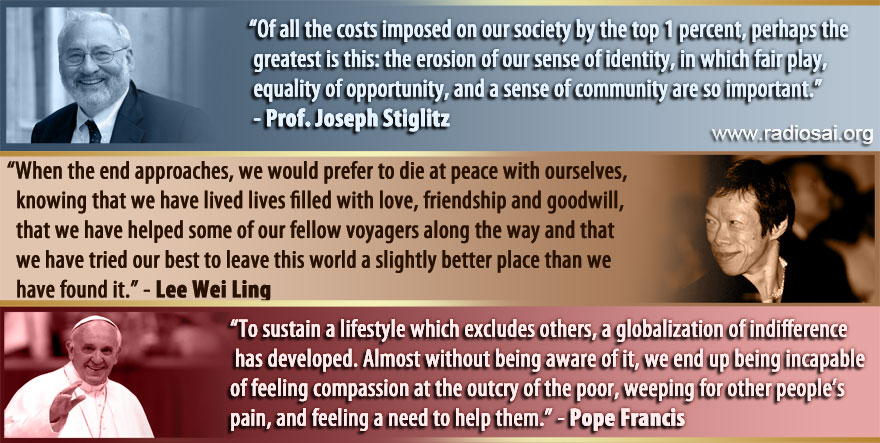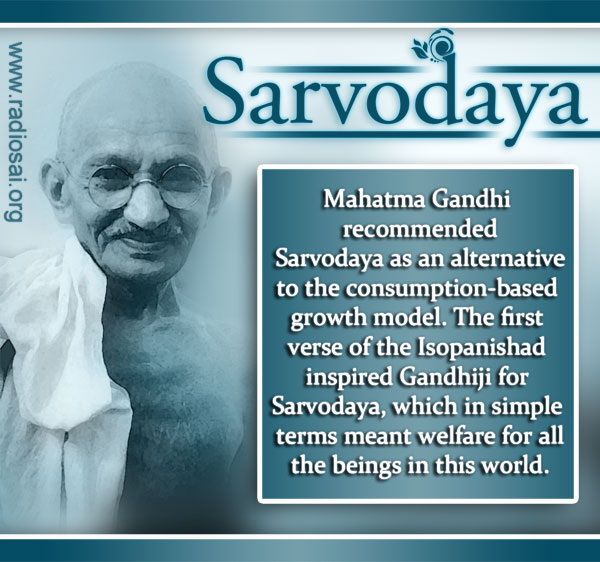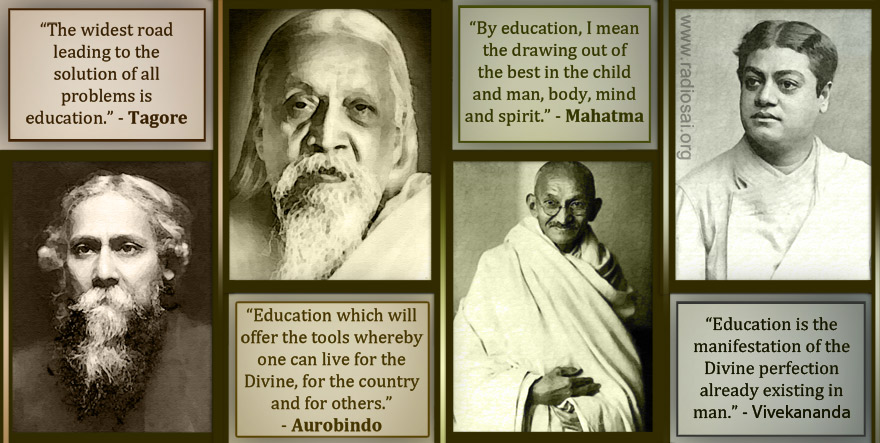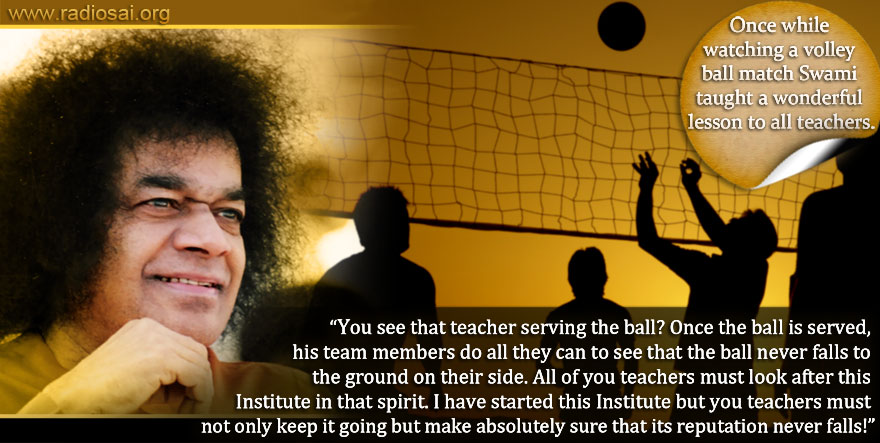|
|
| 'Like' us on Facebook | Follow us: |
Posted on: Mar 09, 2014
Part 02
The Adverse Side of Free Market Ideology
I am sure most of you must be wondering what does spirituality have to do with the market. The short answer is that free-market is the 7-star luxury palace in which kama, krodha, and all their friends live! And from there, kama, krodha and the rest of that infamous gang make most of humanity act like their puppets; that precisely is where spirituality enters the picture. In other words, most of the socio-economic problems we see around the world are the direct result of almost everyone keeping their actions and values in two separate water tight compartments. More explicitly, the free-market philosophy which is sold to all countries under the name of economic reforms, is actually a huge cover to allow free play to greed. In Swami’s language, the free-market philosophy has enthroned swaartham and swaprayojanam, (selfishness and self-interest) and given it full license to do what it wants – no questions asked.
There are of course many who strongly disagree with what I have said but all such dissenters are ardent devotees of the free-market ideology and in their view market can never be wrong and always knows how to correct itself. However, the hard fact is that unlike in the earlier era, the so-called free-market cum trickle-down theory has simply not worked, not even in America where it was invented. You do not have to take my word for it.
Prof. Stiglitz of Columbia University is a distinguished economist who has won the Nobel Prize for Economics, and this is what he says in an article titled, OF THE 1%, BY THE 1%, FOR THE 1%:
It’s no use pretending that what has obviously happened has not in fact happened. The upper 1 percent of Americans are now taking in nearly a quarter of the nation’s income every year.
In terms of wealth rather than income, the top 1 percent control 40 percent. Their lot in life has improved considerably. … While many of the old centers of inequality in Latin America, such as Brazil, have been striving in recent years, rather successfully, to improve the plight of the poor and reduce gaps in income, America has allowed inequality to grow.
An economy in which most citizens are doing worse year after year—an economy like America’s—is not likely to do well over the long haul.
Of all the costs imposed on our society by the top 1 percent, perhaps the greatest is this: the erosion of our sense of identity, in which fair play, equality of opportunity, and a sense of community are so important.
That was an American professor of economics speaking out against the failure of trickle-down economics. Just yesterday, I was listening to President Obama’s annual State of the Union address, a good part of which was devoted to recreating the ladder of opportunity and bringing back upward mobility to the middle class and the poor.
Next I would like to quote briefly from what Lee Wei Ling, the daughter of Lee Kuan Yew the former PM of Singapore (the man who put that tiny country on the map of the world) has written recently. She says:
As I view the crass materialism around me, I am reminded of what my mother once told me: “Suffering and deprivation is good for the soul.”
When the end approaches and we look back on our lives, will we regret the latest mobile phone or luxury car we did not acquire?
Or would we prefer to die at peace with ourselves, knowing that we have lived lives filled with love, friendship and goodwill, that we have helped some of our fellow voyagers along the way and that we have tried our best to leave this world a slightly better place than we have found it?
We know which is the corrrect choice – and it is within our power to make that choice.
 |
And now, Pope Francis too has weighed in on this same subject. Here is an extract from his recent Apostolic Exhortation. The Pope says:
Some people continue to defend trickle-down theories which assume that economic growth, encouraged by a free market, will inevitably succeed in bringing about greater justice and inclusiveness in the world. This opinion, which has never been confirmed by the facts, expresses a crude and naïve trust in the goodness of those wielding economic power and in the sacralized workings of the prevailing economic system.
Today everything comes under the laws of competition and the survival of the fittest, where the powerful feed upon the powerless. As a consequence, human beings are themselves considered consumer goods to be used and then discarded. We have created a “throw away” culture which is now spreading.
To sustain a lifestyle which excludes others, or to sustain enthusiasm for that selfish ideal, a globalization of indifference has developed. Almost without being aware of it, we end up being incapable of feeling compassion at the outcry of the poor, weeping for other people’s pain, and feeling a need to help them, as though all this were someone else’s responsibility and not our own.
Barely fifteen days ago, OXFAM, in a global survey came up with the startling fact that the wealth of the world’s 85 richest people is equal to that of the poorer half of the world’s population. Currently, the world population is about 7,200 million. What Oxfam is saying is that 85 individuals own as much as 3,600 million poor people put together. Can you imagine that?
I digressed into free-market and consumption-based growth and such other matters, not merely because that is the magic mantra we get for free from the World Bank, IMF., etc., but also for the reason that right now this country is under great pressure to implement one more dose of these so-called economic reforms, despite the fact that like elsewhere, we too have ended up with a sharp gap between the haves and the have-nots. Apart from creating a massive income inequality, free-market driven consumption economics has:
a) poisoned the atmosphere almost beyond repair,
b) polluted the oceans beyond repair,
c) depleted the finite water reserves of the planet to dangerously low levels, and
d) robbed future generations of their rightful share of non-renewable resources of this planet.
Many fiercely argue that there is no other alternative to the consumption-based growth model. That is not true, and in fact the alternative was spelt out by Mahatma Gandhi long ago. The Mahatma not only foresaw clearly how machines would dominate humans but also growth in consumption. For him, civilisation did not mean consumption but something else. As he put it,
Civilisation in the real sense consists, not in the multiplication of wants but in the deliberate and voluntary reduction of wants.
The alternative that Gandhi recommended was sarvodaya, which, in simple terms meant welfare for all. Gandhiji says he got the inspiration for sarvodaya from the first verse of the Isopanishad which says:
God the Ruler, pervades all there is in this Universe.
 |
Therefore, renounce and dedicate all to Him,
And then enjoy or use the portion that may all to thy lot,
But never covet anybody’s possession.
Commenting on it Gandhi wrote,
The seer to whom this mantra or verse was revealed was not satisfied with the magnificent statement that God was to be found everywhere. The seer went further and said, ‘Since God pervades everything, nothing belongs to you, not even your body. God is the undisputed, unchallengeable Master of everything you possess.
Based on this, Gandhi asserts that everything in the universe belongs to God which automatically means that nothing belongs to us. By the way, Swami too has stated the same. What this means is that at best, each of us is a trustee of God and must use whatever gift God has given us to serve God by seeing God in all including lower beings, and Nature – that, in a nutshell, was what sarvodaya meant to the Mahatma. As for the gift given to each of us by God, it might be health, wealth, knowledge, creative abilities of various kinds, and so on. Whatever it be we must use that God-given gift for the good of society and the planetary ecosystem, as a part of our service to God – that was the gist of Gandhi’s model for society.
The Limits to Greed and Growth
You may be surprised to hear all this, but the fact is that until not so long ago, grazing land and the high seas, for example, were regarded as commonwealth, a word that was coined by the English and not us. Even today, the continent of Antarctica and the Moon are not supposed to belong to any single country, although the view regarding the oceans has changed vastly, once it was realised that there was wealth under the sea bed.
Curiously, and I would also say amazingly, in the midst of all the resource-grabbing going on all over, there exists in the world of software, the concept of open source software, and the equally revolutionary concept of copyleft as opposed to copyright. Maybe, people are waking up after all and thinking of e-sarvodaya!
I began by saying that this talk is all about growth, stability and order. It is right to ask: “How does all that I have said thus far relate to that title?” The short answer is that where Nature is concerned, excessive growth always leads to instability. Nearly a hundred years ago. The great astronomer Eddington showed that for a star to be a star, it cannot have a mass exceeding say 100 times the mass of our sun.
Likewise, speaking to school students Prof. Weisskopf showed why we cannot have mountains on earth that are say five times as high as the Everest. If you apply that criterion to a neutron star, which by way has a diameter in the range 10 to 15 km or so, the tallest mountain would be only 2 cm!
Nature also shows something more. If you take a tree in say, a rain forest, its height is determined not merely by the physics of the tree but by the larger issue of sustainability of the entire forest.
In short, what Nature teaches us is that:
-
Beyond a point, growth leads to instability, and
-
Instability in turn, leads to disorder.
Stated differently, sustainability, stability and order are in some sense inter-related. Translated to the realm of socio-economics, it means that we simply cannot have endless growth and at the same time a stable as well as an ordered society.
For all of us, there is a higher reason to shun unlimited growth and endless consumption since it is fundamentally contrary to the purpose for which God created humans. Our job is not to grow our desires and fill the pockets of billionaires but to evolve spiritually.
Getting back for a moment to the topic of my talk, one reason why I chose it is to highlight the fact that presently the academic world is polarised into two groups of ideologues – those on the left and those on the right. Those on the right are of course totally wrong but those on the left are equally so. As Gandhiji put it, all they can think of is arithmetical equality.
The time has come to not only place socio-economics but indeed all human endeavours, especially in the area of science and technology on a sound moral footing. A good starting point would be to develop a macro-economic model of sarvodaya, especially because sarvodaya would lead to not only economic fairness but also sustainability, both in the social as well as ecological sense. Above all, it would have a moral basis. I believe a lead in that direction must come from this Institute. Going even further, I would like to make a special appeal to Prof. Pandit who is in the audience to take the initiative to develop such a model, especially because of his expertise in macroeconomics on the one hand and his understanding of Swami’s teachings on the other.
Presently, the environment outside is such that if one talks of spirituality one is either dismissed as a naïve fool or a crook out to make a fast buck. Indeed, outside Swami’s sansthaan, spirituality is a marketable commodity. That kind of myopia and misinterpretation can be wiped out only when the connection between spirituality and life is given an academic basis and foundation. Which institution can give a lead in that direction except this University founded by Bhagawan?
What is Education and the Role of SSSIHL
Which brings me to Swami, and why He gave so much time to education. Looking at the young people in the audience, it would appear that we now are beginning to have students who have never seen Swami. Under the circumstances it is my duty to say a few words, especially to the younger members of this audience about why Swami established this Institute and indeed gave so much of His time to the cause of education.
Let me set the stage by quoting what some of the great sons of India said about education before Independence. I shall start with Tagore who said:
The widest road leading to the solution of all problems is education.
Aurobindo’s vision was similar but more expansive and he declared:
Education which will offer the tools whereby one can live for the Divine, for the country and for others - this must be the ideal of every school which calls itself national.
 |
What about the Mahatma? This is what he said:
By education, I mean the drawing out of the best in the child and man, body, mind and spirit.
Which brings me to Vivekananda who declared:
Education is the manifestation of the Divine perfection already existing in man.
All this was before Independence. After Independence, the constitution made education a state subject, promptly opening the door to politics and degeneration. Mercifully, starting in 1968, Swami established three colleges which He later fused in 1981 into the Sri Sathya Sai Institute for Higher Learning, creating thereby a model not only for this country, but indeed for the whole world.
I leave it to the teachers of the Institute to take time off and describe in detail to our students how much Swami gave of Himself to do precisely what Vivekananda dreamt, namely to squeeze out the Divinity latent in every single student. Swami always stressed selfless service as the best and also the simplest way of squeezing out the Divinity latent within.
Many think of service in terms of distributing this or that. Indeed, that is what most NGOs do. As a social service, that is very much to be commended. What Swami wanted was something different. He did not want us to become a mere delivery service but seekers who try to see God everywhere and, wherever possible, serve those entities. The least we could do is to worship those entities in ways appropriate.
Few of us really understand the Omnipresence of God, which is why we are very comfortable about leading compartmentalised lives, treating Swami and the rest of the world as distinct, totally different and hence not deserving our love to the same extent we are prepared to offer it to the one whom we call Swami. By doing so, we begin to believe that we have friends and foes, and once we stop being alike to everyone, peace shatters into pieces, as Swami often used to tell us.
Sathya, Dharma, Shanti, Prema and Ahimsa are all aspects of the same Divine and therefore absolutely indivisible. If we are able to fragment and compartmentalise the indivisible, it is because of the influence of selfishness and self-interest. Surely, that is not what Swami expects from us, who have personally received so much from Bhagawan. Let us therefore, at this critical juncture in human history, remember that all of us elders connected with this hallowed Institute have a special duty to foster character amongst students sent to us by God to care for and groom.
I would like to end by recalling a small but important incident narrated to me by a former student. I am making a reference to this particular incident because it highlights the heavy responsibility we carry on our shoulders.
This happened around the mid-eighties when the hill-view stadium was far from what it is now. That said, those also were the days when Swami would just drop in to be with the students, watch a match in progress, and so on.
One day a volley ball match was in progress and one side was made up of teachers. Swami came, pulled a chair and sat along with some of the teachers watching the match.
After a while He said to the teacher next to Him:
You see that teacher serving the ball? Once the ball is served, his team members do all they can to see that the ball never falls to the ground on their side.
All of you teachers must look after this Institute in that spirit. I have started this Institute but you teachers must not only keep it going but make absolutely sure that its reputation never falls!
 |
That was typical Swami. He alone could take any incident and use that for teaching a lesson! How much we miss Him now!
God bless you all. Jai Sai Ram.
- Team Radio Sai
(Graphics - Sai Kaustuv Dasgupta)
What do you think about this article? Please let us know by writing in to h2h@radiosai.org. Do not forget to mention your name and country.







